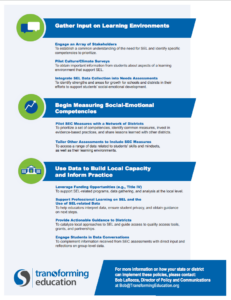There’s a palpable, growing urgency to focus on social-emotional learning (SEL) in our schools. Education experts and policymakers recognize that building healthy relationships and responsible decision-making matters to student outcomes, and teachers overwhelmingly acknowledge that SEL is important to learning. Meanwhile, recent “staggering statistics” reveal the high rate at which today’s students suffer from mental illness and trauma – conditions which certain SEL-related practices can work to address. For these reasons and others, more and more educators are seeking to intentionally cultivate learning environments that help students develop socially and emotionally.
This demand for SEL presents a key opportunity for state and local education leaders to take action. Although the Every Student Succeeds Act (ESSA) – the 2015 law that governs U.S. public education policy – does not specifically mention SEL, it does provide opportunities for State Education Agencies (SEAs) and Local Education Agencies (LEAs) to expand the definition of student success. With this flexibility, SEAs and LEAs can adopt a set of policies that work to systematically integrate SEL throughout the school day.
But what are those policies and how can they take shape?
To answer that question, TransformEd has crafted policy recommendations for local and state leaders seeking to take a data-informed approach to SEL. We specifically designed recommendations that incorporate the use of data because gathering data on SEL allows educators to make meaningful connections between student experiences, school culture, and classroom practice, which enables us to make smarter investments in practices that work for all students.
We spent months speaking to policymakers, researchers, teachers, and families, while analyzing laws and policies, and understanding the latest findings and reports from the field. We grounded our recommendations in a commitment to equity and a belief in using research to inform practice. We also sought concrete examples of each recommendation in action to highlight the important work that is already underway in states and districts across the U.S. Our recommendations span the following categories:
- Gather Input on Learning Environments and SEL: SEAs and LEAs should solicit input on learning environments from a variety of stakeholders because it enables education leaders to understand student perspectives and local interests. This information will help to create data systems and SEL approaches that reflect the school community’s beliefs, values, and needs. For example, surveying students and families on school culture and climate elevates student voice, helps to identify environmental factors that can support SEL, and provides important context for interpreting data on students’ SEL.
- Begin Measuring Social-Emotional Competencies (SEC): The state of SEC measurement is new and constantly evolving, but the field is already building upon encouraging information about the validity and reliability of survey-based and performance-based measures. While we do not recommend that these measures become a part of formal accountability frameworks, we do believe that the evidence is strong enough to support using SEC measures to drive continuous improvement. SEAs could leverage the flexibility of ESSA to collect data with a network of LEAs. The network can prioritize specific competencies, identify a common set of measures, use the resulting data to coordinate evidence-based practices, and share what they’re learning with others. For example, the exSEL Network— a group of nine Massachusetts LEAs committed to working together to expand SEL in schools—plans to use SEC measures to inform practice and improve student outcomes.
- Use Data to Build Local Capacity & Inform Practice: A data-informed approach to SEL should include the supports required to use those data effectively. To that end, SEAs and LEAs should invest in building educators’ capacity to unpack SEL-related data and use evidence-based practices to address any growth areas that emerge. In an encouraging policy moment, Congress recently voted to nearly triple the funding for Student Support and Academic Enrichment Grants within Title IV of ESSA (also known as “Title IV grants”) from the previous year, from $400 million to $1.1 billion.[1] These block grants can be broadly used by LEAs to address a host of educational activities that support student health, safety, and a well-rounded education, including SEL.[2]
Adopting these policy recommendations can illuminate areas in which LEAs are supporting all students’ social and emotional development and highlight areas for improvement. LEAs can then use data to identify effective SEL approaches while filling in gaps with existing or new programs, policies, and practices to support student learning.
The current policy opportunities enable us to create learning environments in which all students flourish. Of course, supportive learning environments won’t emerge from policy alone, and large-scale change won’t happen overnight. But if policymakers adopt a data-informed approach to SEL, educators can access and act on information to support students’ social and emotional development more effectively. And this in turn enables schools to better prepare students for success in school and life.

This post was originally published in the Assessment Work Group’s blog, Measuring SEL, under the title “Leveraging Policy to Support a Data-Informed Approach to Social-Emotional Learning.”
[1] Ujifusa, A. (2018, March 23). President Trump signs spending bill that includes billions more for education. Education Week. Retrieved from http://blogs.edweek.org/edweek/campaign-k-12/2018/03/president_trump_signs_spending_bill_increases_education_money_billions.html
[2] Secs. 4107, 4108, 4109 Every Student Succeeds Act (ESSA) (PL 114-95, December 10, 2015). Washington, D.C.: U.S. Government Publishing Office. Retrieved from https://www.congress.gov/114/plaws/publ95/PLAW-114publ95.pdf


